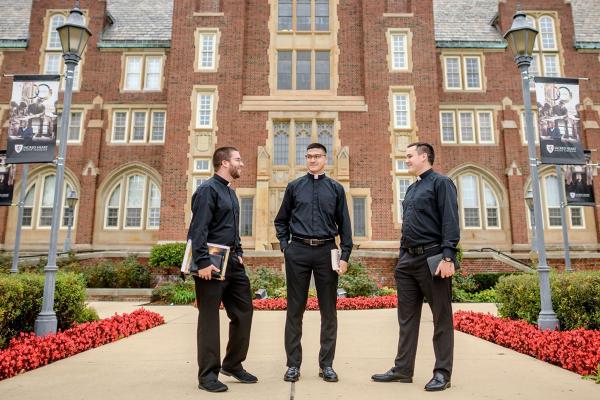
A new study cites trusted relationships with parish priests as a deciding factor in cultivating vocations and reducing the priest-to-parishioner ratio as essential for making such encounters possible.
The 2023 "State of Priestly Vocations in the United States" by Texas-based Vocation Ministry concludes that "the overall role of priests in fostering vocations is significant," with "around 70 percent of those ordained" reporting that they were invited by a priest to consider the calling.
"We know the priest is the number one factor for a young man saying 'yes' to the priesthood," Vocation Ministry founder Rhonda Gruenewald told OSV News.
But as ordination numbers decline while many parishes close or merge, priests are becoming responsible for a greater number of parishioners, Gruenewald said. With increased administrative and pastoral responsibilities, clergy often have little time and energy to mentor teens and young men who might be interested in religious life.
"If that (priest-to-parishioner) number is lower, then priests can create relationships that foster vocations," said Gruenewald, whose report draws on data from the Official Catholic Directory along with input from vocation directors and seminarians from around the country.
According to the Center for Applied Research in the Apostolate at Georgetown University (CARA), in 2022 there were 34,344 priests (24,110 diocesan, 10,234 religious) and 452 priestly ordinations in the U.S., serving 16,429 parishes and 66.5 million "parish-connected" Catholics. Just 66 percent of the diocesan priests were in active ministry, with an average of one active diocesan priest per parish.
The Vocations Ministry study grouped the nation's Catholic dioceses into four tiers based on the size of their Catholic population, and then calculated how many replacement priests, seminarians and ordinations are needed in each diocese for pastoral viability, based on current conditions.
Gruenewald concluded that the 2021 vocation data showed only 33 dioceses ordained enough men to satisfy a "base need ordination rate," while 17 were meeting their "base need seminarian rate." Another 42 dioceses had no ordinations during that period.
She admits that the data "might be difficult for some to digest."
CARA executive director Jesuit Father Thomas Gaunt, who reviewed the Vocations Ministry report, told OSV News the study did not account for shifts in the Catholic population across the U.S., which have led to a "massive movement of Catholics out of the cities and into the suburbs, and from the Northeast and Midwest to the South and West" of the nation.
However, Father Gaunt noted the report was correct in its "overall contention on targeting the importance of relationships in encouraging vocations."
Of the four population tiers in the Vocations Ministry report, the highest-performing group was that with the lowest population and the lowest priest-to-parishioner ratio. Dioceses in this tier — which included Lincoln, Neb.; Tulsa, Okla.; and Reno, Nev. — typically ordain six times as many men as do the nation's most populous dioceses.
Gruenewald stressed that Catholics have plenty of options for countering the declines in priestly vocations, such as regular prayer, education about vocations and how to foster them, affirmation of current priests and seminarians and youth ministry.
"Priests and parishioners need to find those pockets where young people are and bring the vocations message to them," she told OSV News. "Instead of throwing our hands up and saying, 'Oh well,' we need to be intentional and strategic. Vocations can happen if you believe. Let's get to work."
Download the report for free at vocationministry.com.
Please read our Comments Policy before posting.
Article comments powered by Disqus Eveld: ‘Knowing the Lord called me is an awesome thing’
Eveld: ‘Knowing the Lord called me is an awesome thing’
 Preparatory year added to diocesan seminary formation
Preparatory year added to diocesan seminary formation
 ‘Share in all of it’: Ashburn wants to walk with people
‘Share in all of it’: Ashburn wants to walk with people
 Hartnedy took advice: ‘Figure out what God wants for me’
Hartnedy took advice: ‘Figure out what God wants for me’
 Winning directory photo honors Our Lady of Guadalupe
Winning directory photo honors Our Lady of Guadalupe
 St. Paul says: How does the Bible define love?
St. Paul says: How does the Bible define love?
 6 steps to getting married in Diocese of Little Rock
6 steps to getting married in Diocese of Little Rock
 Most frequently asked questions on Catholic marriage
Most frequently asked questions on Catholic marriage
 St. Joseph a model of solidarity with immigrants
St. Joseph a model of solidarity with immigrants
 Two gifts after Jesus’ death: Virgin Mary and Eucharist
Two gifts after Jesus’ death: Virgin Mary and Eucharist
 Why we have an altar, and not just a communion table
Why we have an altar, and not just a communion table
 Pope: Wars should be resolved through nonviolence
Pope: Wars should be resolved through nonviolence
 Living relationship with Jesus Christ in the Eucharist
Living relationship with Jesus Christ in the Eucharist